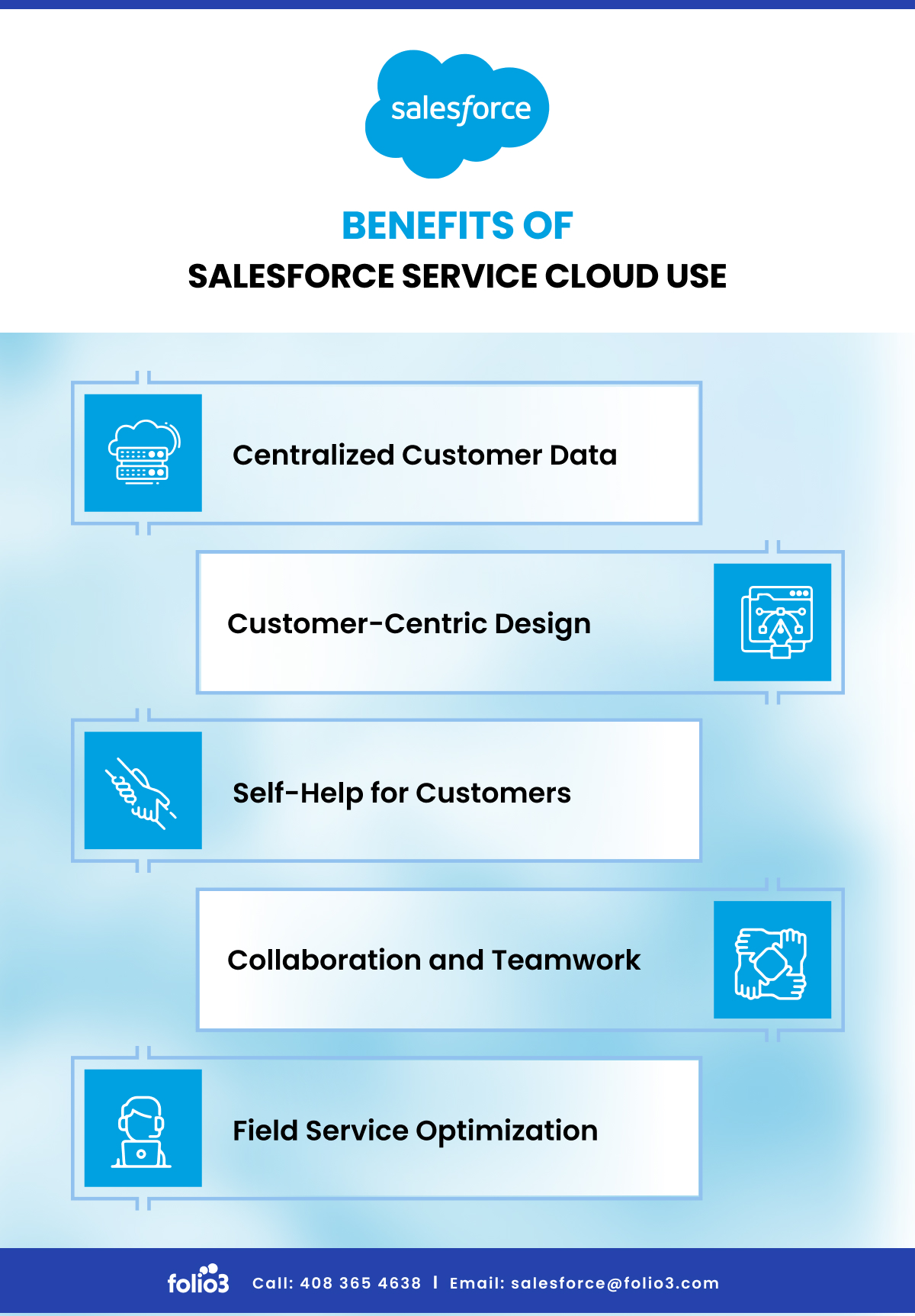The world keeps changing the rules for customer service as customer expectations and technology change. In the midst of such uncertainty, you need something to rely on–that’s where Salesforce Service Cloud comes in!
Salesforce Service Cloud use will make you and your business stand out from your competitors. It’s a powerful tool with robust features and capabilities. Not only will it provide top-notch customer service, it will also help you with your business processes.
If you are not making the most out of your Salesforce Service Cloud use, let us help you!
Quick Overview of Salesforce Service Cloud
Service Cloud is a customer service software solution by Salesforce that helps businesses manage customer interactions across various channels – email, phone, messaging, chat, etc.
It’s part of the broader Salesforce 360 platform, allowing seamless integration with other products.
The key features of Salesforce Service Cloud are:
- Case Management: Create, track, and resolve customer issues.
- Omnichannel Support: Offer consistent service across various channels.
- Knowledge Base: Empower customers with self-service options.
- Agent Productivity Tools: Equip agents with tools like case routing.
- Analytics and Reporting: Gain valuable insights into customer service.
- AI-powered Features: Use AI tools like case classification, sentiment analysis, and chatbots.
Read More: What Is Salesforce Service Cloud
Benefits of Salesforce Service Cloud Use
Before you get your hands on the best ways to integrate Salesforce Service Cloud, let’s clear all your doubts about it. Here are all the benefits of Service Cloud you must know about:
Centralized Customer Data
Gone are the days of scattered customer data across multiple systems. By consolidating all customer information in one centralized location, Service Cloud wins the game.
Whether it’s purchase history, contact details, or support interactions, everything is easily accessible within the platform. This time-saving approach guarantees data accuracy and consistency across the organization.
Customer-Centric Design
The cloud is built around the customer-first approach.
From intuitive interfaces to customizable workflows, every side of the platform is designed to prioritize customers’ preferences. This customer-centric approach enhances satisfaction and fosters long-term loyalty and advocacy.
With the use of Salesforce Service Cloud, you can put your customers at the center of everything you do.
Self-Help for Customers
One of the standout features of Service Cloud Salesforce is its self-help capabilities. With the platform’s knowledge base, your customers can quickly find answers to their queries without human intervention.
It reduces the workload on your support agents and facilitates users’ resolving issues independently. Eventually, it leads to faster resolution and improved customer satisfaction.
Collaboration and Teamwork
The use of Salesforce Service Cloud is made better with features like Chatter and collaborative case management. These features let teams easily communicate, share information, and work together to resolve customer issues.
Additionally, this property also ensures that everyone is on the same page. It leads to faster resolution times and enhanced customer satisfaction.
Field Service Optimization
Salesforce Service Cloud offers Field Service Lightning (FSL) for businesses with field service operations. It is a needed solution for managing on-the-go support that manages numerous tasks.
For example, when it’s about maintenance, installations, or repairs, FSL equips field technicians with the tools they need to excel in their roles.
By combining FSL with Salesforce Service Cloud, businesses can seamlessly manage end-to-end service operations.
Deeper Customer Understanding
One of the key benefits of Salesforce Service Cloud use is the access to customer information.
Businesses can create detailed customer profiles by aggregating data from various touchpoints, including email, phone, and social media. These profiles render valuable insights into preferences, behavior, and needs.
With Salesforce Service Cloud, businesses can stay ahead of the curve by anticipating customer needs and proactively addressing issues.
Read More: Advantages of Salesforce Customer Service Cloud
9 Ways to Use Salesforce Service Cloud
Customer Data for Personalized Interactions
Leverage data to tailor offerings and content to individual needs.
|
Area |
Key Focus |
|
Customer Data for Tailored Solutions |
Use data to develop specific solutions aligned with customer context. |
|
Support Process Optimization |
Optimize support processes for efficiency and customer satisfaction. |
|
Proactive Retention Strategies |
Anticipate churn and implement strategies to retain valuable customers. |
|
Social Media for Real-Time Engagement |
Use social media to interact with customers directly and in real-time. |
|
Strategic Breaks |
Design and implement solutions to address specific customer pain points. |
|
Re-Engaging Inactive Subscribers |
Win back inactive customers with targeted strategies. |
|
Data Consistency through Integrations |
Ensure seamless data flow across systems for accurate insights. |
|
Advanced Analytics |
Utilize advanced analytics to uncover deeper customer understanding and trends. |
1. Customer Data for Personalized Interactions
We know that the effectiveness of customer service lies in detailed knowledge of your customers. With use of Salesforce Service Cloud excels in this aspect by offering seamless integrations with various data sources.
Hence, it allows you to merge all customer interactions, preferences, and history under one roof. You can break down data blocking by leveraging integrations.
Moreover, it also provides a broader view of your customers’ journey. Eventually, it forms more informed decision-making and personalized interactions.
2. Customer Data for Tailored Solutions
In the age of personalization, understanding your customers gives you an edge. The best way to do so is by tapping into customer preferences, past interactions, and behavioral patterns.
This way, you can deliver tailored solutions and recommendations that resonate with each individual. All thanks to Service Cloud for mapping businesses to use customer data intelligently.
3. Support Process Optimization
Salesforce Service Cloud organizes support processes, optimizes agent workflows, and delivers exceptional service experiences.
The platform has every resource your team would need to resolve issues promptly. The tools also exceed clients’ expectations and build lasting customer relationships.
4. Proactive Retention Strategies
Customer backout or bounce rate does more harm than anything else during business cycle. Therefore, it is known as a significant pain point for businesses.
On the other hand, it also provides an opportunity for improvement. Yes, with Salesforce Service Cloud use, you can get deep into customer data to identify the root causes of churn.
Trends, feedback, and engagement metrics can help you pinpoint the areas for enhancement and proactively address issues. This proactive approach reduces blackouts and improves overall customer satisfaction and retention.
Read More: Features of Service Cloud Salesforce
5. Social Media for Real-Time Engagement
There is no doubt about the worth of social media in this interconnected world. The powerful tool has emerged as a massive channel for customer engagement.
When Salesforce Service Cloud integrates with social media platforms, it monitors brand mentions, responds to inquiries, and engages with customers in real time. So, do not think twice before leveraging social media insights to
- Gain valuable feedback.
- Identify emerging trends.
- Tailor Your Service Offerings.
6. Strategic Breaks
Ever thought of taking a break? We bet not! In the fast-paced business world, it’s easy to get caught up in the daily grind. However, strategic breaks are instrumental in recharging your team and re-evaluating your strategies.
Use the “100-Day Rest” approach to step back every quarter to reflect on your Salesforce Service Cloud implementation process.
Besides that, you can identify areas for improvement and realign your goals. This periodic review ensures that your CRM efforts align with your evolving business objectives.
7. Re-Engaging Inactive Subscribers
Regardless of how great the business is going, it always has a group of inactive subscribers. Hiring a Salesforce Service Cloud consultant services provider can help you with re-engagement strategies.
You can deliver personalized offers and reminders to win back dormant customers by leveraging automation and targeted campaigns.
Furthermore, you can also develop strategies to identify and re-engage inactive subscribers.
8. Data Consistency through Integrations
Whether using a helpdesk system or a ticketing tool, integrating Service Cloud can
- Streamline operations.
- Eliminate duplicate efforts.
- Enhance data consistency.
This integration improves efficiency and enables a seamless customer experience from inquiry to resolution.
Read More: Salesforce Service Cloud Generative AI
9. Advanced Analytics
Another Salesforce Service Cloud use case is the use of data analytics to drive strategic decision-making.
It is the lifeblood of modern businesses, and Service Cloud offers advanced analytics capabilities to extract actionable insights from your customer data. The deployment of sophisticated analytics tools assists businesses at many points, such as uncovering hidden patterns, identifying emerging trends, and forecasting future behavior precisely.
All these insights empower you to make data-driven decisions and deliver superior service experiences to your clients.
Conclusion
All the strategies outlined above have the potential to unlock significant gains for your organization. With these practices, Salesforce Service Cloud use goes beyond standard customer service efforts.
Invest in Salesforce Service Cloud today to reap the benefits later. Remember, mastery is a slow yet consistent process. So, take your time to embrace the full potential of Service Cloud and elevate your customer service game.
FAQs
Why Choose Salesforce Service Cloud?
Salesforce Service Cloud is famous for its comprehensive customer service solution that provides tools for customer support, like case management, real-time chat, and AI capabilities.
How Does Salesforce Use the Service Cloud?
Salesforce uses the Service Cloud to empower its customer support team. It enables them to deliver faster, more personalized customer service through various channels and automate responses.
Is Salesforce Service Cloud Good?
Yes, Salesforce Service Cloud is a good choice for businesses seeking to improve customer service operations.

Hasan Mustafa
Engineering Manager Salesforce at Folio3
Hasan Mustafa delivers tailored Salesforce solutions to meet clients' specific requirements, overseeing the implementation of scenarios aligned with their needs. He leads a team of Salesforce Administrators and Developers, manages pre-sales activities, and spearheads an internal academy focused on educating and mentoring newcomers in understanding the Salesforce ecosystem and guiding them on their professional journey.




